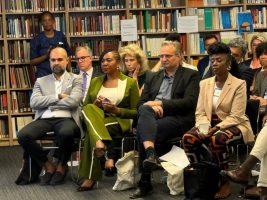African leaders and innovators at the 2025 United Nations General Assembly (UNGA) have called for greater ownership of development and innovation across the continent, insisting that Africa must design its own future with or without foreign aid.
At a side event convened by eHealth Africa in partnership with Population Services International (PSI), the Population Council, and Reach Digital Health, speakers highlighted how African-led solutions are reshaping health, technology, and community development. The event, themed “African-led Innovation: Shaping Sustainable Futures With or Without Aid,” drew participants from across the continent.

Sierra Leone’s Minister of Information and Civic Education, Chernor Bah, said aid has long influenced Africa’s systems but without true ownership. “For decades, aid has shaped health, innovation, and development in Africa—but often without African ownership at the centre,” Bah told participants. “This created systems that were never truly ours. But Africans have always innovated. Innovation is part of who we are. This is a new era—an era of designing our own future, where African ideas and creativity lead the way.”
Dr. Ola Brown, founder of HealthCap Africa, argued that investing in local healthcare innovation benefits the global community. “In the U.S., the Internet was born from a DARPA project, and 75 per cent of new drugs trace back to government-funded research. But private capital scaled those innovations,” she explained. “In Africa, governments face capital constraints, so the model may look different. But when we invest in healthcare innovation in Africa, we don’t just create a healthier continent—we create a healthier world.”
PSI Global President, Michael Holscher, said sustainability depends on community ownership. “One of the most critical players is the community itself—that woman in the marketplace, or that man in the village,” he noted. “Our projects have timelines. But beyond short-term results, the question always is: what happens when we leave? True sustainability rests in the ownership of stakeholders.”
Judith Bruce of the Population Council stressed inclusivity, cautioning against overlooking women and young people. “Too often the word ‘community’ is represented by a handful of older men. But where are the adolescent girls? Where are the young women?” she asked. “Every study showing ‘impact’ should begin with the question: who is included here, and who is not?”
Jean Philbert Nsengimana, Chief Digital Health Advisor at Africa CDC, urged African innovators to replicate the fintech success of M-PESA in healthcare. “We need the same leap in health tech. Africa has the solutions within. If aid comes, good. If not, we must—and can—move forward regardless,” he said.
From South Africa, Reach Digital Health CEO Debbie Rogers described how constraints had fueled progress in digital health. “Our MomConnect programme has reached five million women. The statistic I’m proudest of is that 98 per cent of women recommend it to others,” she said. “Constraints drive creativity. In Africa, we don’t just work around them—we leapfrog because of them.”
For eHealth Africa, the gathering was a chance to emphasize the importance of African-driven partnerships. “Being here, you can really feel the energy around everything that’s happening,” said Atef Fawaz, Executive Director of eHealth Africa. “It’s exciting to meet partners who share the same mindset: localising innovation and reducing donor dependency. Africa will be among the top 20 emerging markets in the next two decades. My message to the younger generation is: look into Africa, invest in Africa.”
Ota Akhigbe, Director of Partnerships and Programmes at eHealth Africa, added that visibility on global platforms has strengthened Africa’s influence. “Africa is no longer just invited to the table—Africa is leading conversations,” she said. “With visibility comes influence. We are not only creating solutions at home but also bringing them here to influence global conversations.”
The evening ended with a light-hearted Jollof rice tasting contest, which Minister Bah declared in favour of Senegal, underscoring Africa’s cultural pride alongside its push for innovation sovereignty.






